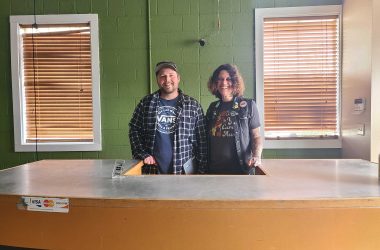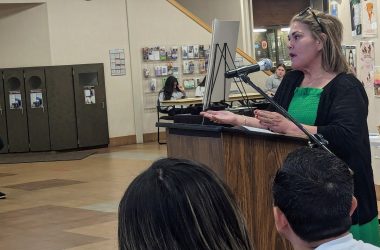When Chad Ludwig moved to Oregon a decade ago, he found the state did little to ensure deaf Oregonians could access information and communicate.
That was in contrast to his home state, California, which has for years funded services like sign language interpretation and job placement specifically for deaf and hard of hearing residents. Oregon was at the time the only western state without direct services, Ludwig said.
“There’s really nothing here in the state,” he remembered thinking, signing via an interpreter in an interview with Salem Reporter.
Ludwig, a Salem resident who is deaf, grew tired of waiting for legislators to act after years of efforts to outline and fund a similar program went nowhere. He decided to take on the task himself and in 2017 founded Bridges Oregon, a nonprofit led by deaf community members, to advocate and provide direct assistance to the roughly 1 million Oregonians with hearing loss, and the about 4,000 who use sign language to communicate. He now works as the nonprofit’s volunteer executive director.
The nonprofit formed shortly after a statewide assessment Ludwig and other advocates pushed for, outlining the needs of deaf Oregonians.
The assessment concluded state policies, as well as practices among schools, employers and in health care, often limit options and make communication more difficult deaf people. That can be because of inaccurate assumptions, like that deaf people who can speak verbally don’t need interpretation, or that all deaf people communicate in the same way.
“The separate structures of Oregon’s educational system for Deaf and hard of hearing children means that when a need for change in the child’s educational delivery is recognized, it is slow to be implemented and further precious time is lost,” the report said. It also noted deaf Oregonians struggle with finding and keeping employment, often facing communication barriers at work and misconceptions about what they’re able to do.
Ludwig was born into a hearing family, but grew up with a mother who was supportive of sign language and encouraged the rest of the family to sign. As a result, Ludwig wasn’t as socially and linguistically isolated as many deaf children are during crucial early years of language development.
Ludwig said many deaf children aren’t so lucky. Hearing people often assume spoken language is superior to signing and try to get deaf children to communicate via speaking. The result can be a child growing up without any native language at all if they can’t communicate in spoken language and are deprived of learning to sign.
“Speaking and having a language that way is not for everybody and it did not work for me,” Ludwig said, noting he still can’t speak in a way hearing people can understand after 18 years of speech therapy.
Hearing people also fail to recognize that languages like American Sign Language are distinct linguistically, with their own grammar and vocabulary, and aren’t just dialects of English or other spoken languages, he said. Accessing interpreting services in public locations like health care providers or when reporting a crime to law enforcement remain significant barriers that prevent deaf people from communicating with the hearing world.
Ludwig said knowing he was privileged to grow up with the resources he did as a deaf person made him want to advocate for other members of the community who face greater difficulties having their needs met, including those who are deaf and have intellectual or physical disabilities that impact their ability to sign, and deaf people of color.
“There are so many members of the community that we serve and they don’t have the ability to advocate or have a voice or communicate their needs that they really do need,” he said.
Bridges started small but has recently secured several grants allowing Ludwig to hire employees who work directly with deaf Oregonians and expand programs. In the past year, they’ve served 347 clients directly.
In 2021, Bridges received funds through the Oregon Department of Justice’s Victims of Crimes Act fund to advocate for deaf Oregonians who are victims of crime. Ludwig said before applying, he contacted 52 other agencies around Oregon who worked with crime victims and asked if they had a way to work with deaf clients, or if they had any on the caseload.
“The response I got was zero,” he said. Now, Bridges has almost 60 deaf clients on its caseload for one advocate — four times the state-recommended ratio.
“Clearly there’s a huge need that needs to be addressed,” he said. He applied for and was recently awarded another grant to fund a second advocate working specifically with deaf victims of sexual assault and domestic violence.
Bridges also has a housing advocate, funded through the Fair Housing Council of Oregon, to help deaf people find housing and advocate for accommodations, like visual security alert systems. Bridges also offers fee-based services including sign language interpreter assessments and accessibility reviews for compliance with the Americans with Disabilities Act.
Ludwig was recently selected as one of 15 winners of the MAPS Community Award, an annual honor from the Salem-based credit union’s foundation that recognizes people making a difference in the region.
The award in August comes on the heels of a national honor. Bridges was recognized in July with the National Association of the Deaf’s Affiliate Excellence Award.
“It was a little overwhelming, but at the same time it was a recommitment of why this works, and why this work is important,” Ludwig said.
Ludwig retains a full-time job as the director of Western Oregon University’s Research & Resource Center with Deaf Communities. With the $1,000 he contributed to Bridges from the MAPS award, he’s hoping to pay for a grant writer to help the nonprofit secure additional funding, and eventually move to doing the executive director role as a paid position while hiring additional employees.
“We’re creating job opportunities to serve the community by and for the community themselves,” Ludwig said.
Contact reporter Rachel Alexander: [email protected] or 503-575-1241.
JUST THE FACTS, FOR SALEM – We report on your community with care and depth, fairness and accuracy. Get local news that matters to you. Subscribe to Salem Reporter starting at $5 a month. Click I want to subscribe!

Rachel Alexander is Salem Reporter’s managing editor. She joined Salem Reporter when it was founded in 2018 and covers city news, education, nonprofits and a little bit of everything else. She’s been a journalist in Oregon and Washington for a decade. Outside of work, she’s a skater and board member with Salem’s Cherry City Roller Derby and can often be found with her nose buried in a book.









